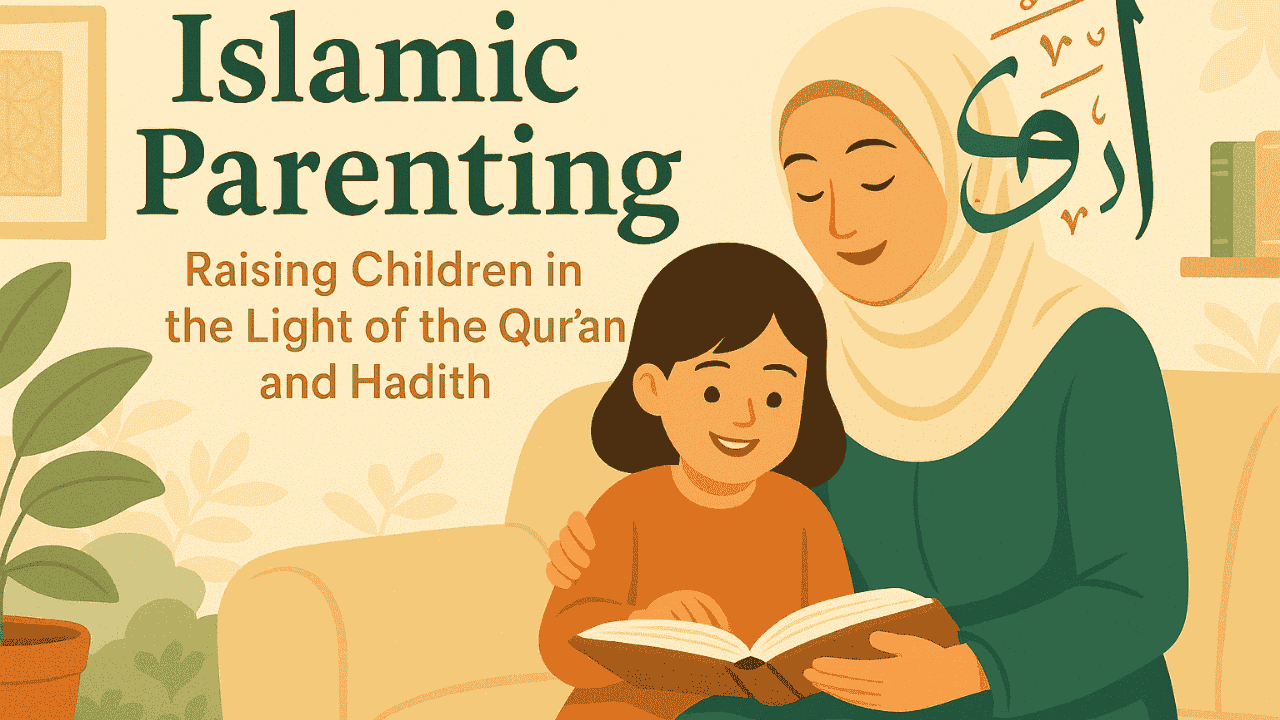Islamic Parenting: Raising Children in the Light of the Qur’an and Hadith
Introduction:
Children are a priceless blessing and a test from Allah ﷻ. The Qur’an says:
“Your wealth and your children are but a trial.” (Surah At-Taghabun 64:15)
Therefore, raising children is not only about love, but also about guiding them properly and nurturing them as righteous believers. This is an essential responsibility of every parent.
1. Children as an Amanah (Trust from Allah)
Allah commands in the Qur’an:
“O you who believe! Protect yourselves and your families from a Fire whose fuel is people and stones.” (Surah At-Tahrim 66:6)
This verse makes it clear that parents are responsible for nurturing their children in faith, worship, and righteous deeds.
2. Naming and First Education
The Messenger of Allah ﷺ said:
“Give your children good names.” (Abu Dawood)
A meaningful and beautiful name is not only an identity but also impacts the child’s personality and mental growth positively.
Additionally, giving the Adhan in the newborn’s ear, performing Tahneek, and teaching them Allah’s name from infancy marks the beginning of spiritual parenting.
3. Teaching Tawheed and Faith
Luqman (عليه السلام) advised his son:
“O my son! Do not associate anything with Allah. Indeed, Shirk is a great injustice.” (Surah Luqman 31:13)
The foundation of a child’s faith is laid from an early age. When parents teach Tawheed, it sets the right path for all of the child’s deeds.
4. Love and Mercy
The Prophet ﷺ showed immense love toward children. He said:
“He is not of us who does not show mercy to the young and respect to the elders.” (Tirmidhi)
👉 Children should not be abused, neglected, or humiliated. Instead, they should be raised with love, compassion, and mercy. This strengthens their self-confidence and moral character.
5. Teaching Manners and Etiquette
The Prophet ﷺ said:
“Honor your children and teach them good manners.” (Ibn Majah)
Children must be taught not only information but also virtues such as truthfulness, patience, justice, kindness, and humility.
6. Education and Knowledge
The first revelation of the Qur’an was:
“Read in the name of your Lord who created.” (Surah Al-‘Alaq 96:1)
It is the duty of parents to provide both religious and worldly education to sons and daughters alike. Without knowledge, faith cannot be complete, nor can one contribute rightly to society.
7. Physical and Mental Development
The Prophet ﷺ said:
“Your body has a right over you.” (Bukhari)
Healthy food, exercise, play, rest, and emotional well-being are vital for children. Without a sound body and mind, complete parenting is impossible.
8. Discipline and Order
Parents should not only show love but also teach discipline with fairness.
The Prophet ﷺ said:
“Instruct your children to pray when they are seven years old, and discipline them if they do not (pray) at ten years old.” (Abu Dawood)
This is not harshness, but gradual training to instill religious responsibility.
9. Challenges of Modern Parenting
Today, raising children is influenced not only by family but also by social media, technology, school environment, and peer pressure.
Parents must remain vigilant about their children’s online activities, friends, and surroundings. Islamic parenting means not just making du‘a but also ensuring a righteous environment for children.
Conclusion:
In Islam, parenting is not merely raising a child but safeguarding Allah’s trust. Through proper parenting, a family can attain success in both this world and the Hereafter.
The Prophet ﷺ said:
“When a person dies, all his deeds come to an end except three: ongoing charity, beneficial knowledge, or a righteous child who prays for him.” (Muslim)
👉 Therefore, raising a righteous child is the greatest form of Islamic parenting.
🕌 Course Description:
Talimus Sunnah Academy presents a special course:
“Islamic Parenting: Raising Children in the Light of the Qur’an and Hadith.”
This course guides parents on how to raise their children as an Amanah (trust) from Allah — with love, mercy, discipline, and proper guidance.
📚 Key topics include:
Spiritual, moral, and emotional development of children
Teaching Tawheed and faith from an early age
Islamic manners, values, and character training
Challenges of modern parenting and practical solutions
✨ Our goal is to help parents nurture a righteous generation who will be a source of goodness for society and the Ummah.
SHARE


